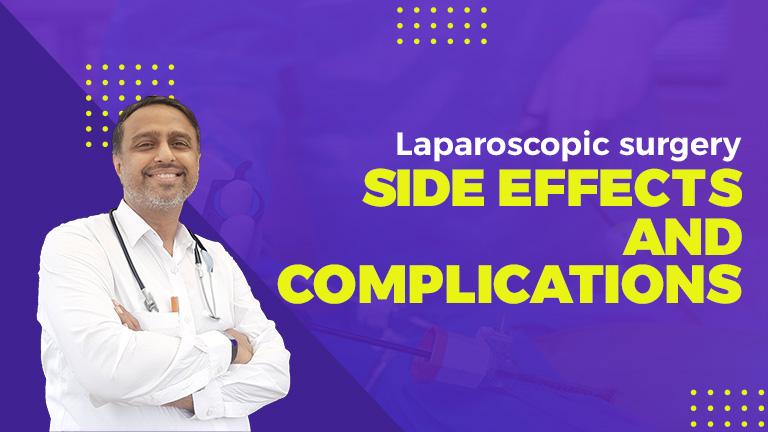Laparoscopic surgery, commonly referred to as minimally invasive surgery or keyhole surgery, is a type of surgery that makes small incisions inside the body and utilises specialised devices to carry out treatments. It has become a popular alternative to traditional open surgery for many reasons, such as minimal incision, less pain, quick recovery, and fewer infections. Today, it is used to treat various dysfunctions such as hernia, gall bladder, anti-reflux, appendix and more.
After undergoing laparoscopic surgery, it’s common to experience various symptoms, side effects, and potential complications during the recovery period. Here’s a breakdown of what you might expect from post-laparoscopic surgery side effects and what can make a need to visit the doctor again.
Common Symptoms and Side Effects After Laparoscopic Surgery
Pain and Discomfort: Pain around the surgical site and in the abdomen is normal. It’s usually managed with prescribed pain medications.
Fatigue: Feeling tired or fatigued is common in the first few days after surgery as your body recovers.
Swelling and Bruising: Mild swelling and bruising around the incision sites are normal. This should gradually improve over time.
Gas and Bloating: Some patients experience bloating and gas discomfort for a few days due to the carbon dioxide used during surgery.
Nausea and Vomiting: Anesthesia and pain medications can sometimes cause nausea and vomiting immediately after surgery.
Sore Throat: If a breathing tube was used during surgery, you might have a sore throat afterwards.
Constipation: Pain medications and changes in activity levels can lead to temporary constipation. Stay hydrated and follow your doctor’s advice for managing this.
Shoulder Pain: Some patients experience referred pain in the shoulder due to the carbon dioxide irritating the diaphragm’s nerves. This pain usually subsides within a day or two.
Potential Complications after Laparoscopic Surgery
While laparoscopic surgery is generally considered safe, there are potential post-laparoscopic surgery complications that can be seen such as;
Infection: Incision sites can become infected. Watch for signs such as increased pain, redness, swelling, warmth, or discharge.
Bleeding: Excessive bleeding at the surgical site or internally can occur but is rare.
Adverse Reaction to Anesthesia: Anesthesia can lead to complications in some individuals, including breathing difficulties, allergic reactions, or medication side effects.
Blood Clots: Reduced mobility after surgery can increase the risk of blood clots forming. Symptoms include swelling, pain, warmth, or redness in the legs.
Organ or Vessel Injury: During surgery, there’s a minimal risk of unintentional damage to nearby organs or blood vessels.
NOTE: The above-mentioned problems or complications after laparoscopic surgery may not necessarily create a situation to panic, but it’s always better to consult either on the phone or visit your doctor once and treat it before it worsens.
When to consult a doctor after laparoscopic surgery?
After undergoing laparoscopic surgery, it’s important to closely monitor your recovery and contact your doctor if you experience any concerning symptoms or issues. Here are some situations in which you should consult a doctor after laparoscopic surgery:
Increased Pain: Some pain and discomfort are normal after surgery, but if your pain becomes more intense or is not adequately controlled by prescribed pain medications, contact your doctor.
Fever: A low-grade fever can be common in the immediate postoperative period. However, if you develop a fever above 101°F (38.3°C) that persists or worsens, it could be a sign of infection and should be evaluated by a doctor.
Redness, Swelling, or Discharge: If you notice increased redness, swelling, warmth, or discharge (such as pus) around the incision sites, this could indicate an infection and should be examined by a healthcare provider.
Excessive Bleeding: While some minor oozing is normal, if you experience significant bleeding from the incision sites or notice blood in your urine, stool, or vomit, contact your doctor.
Difficulty Breathing: If you experience shortness of breath, chest pain, or persistent coughing, seek medical attention immediately, as these could be signs of complications like a blood clot in the lungs.
Nausea and Vomiting: Occasional nausea and vomiting can be normal due to anesthesia and pain medications, but if these symptoms are severe, persistent, or accompanied by other concerning symptoms, contact your doctor.
Difficulty Urinating: If you have trouble urinating or experience pain or discomfort while urinating, this could indicate a urinary tract issue that requires medical evaluation.
Changes in Bowel Habits: If you experience severe constipation, diarrhea, or changes in bowel movements that persist beyond a couple of days, consult your doctor.
Unusual Pain or Symptoms: If you experience any new, unusual, or persistent symptoms that cause concern, such as weakness, dizziness, unexplained weight loss, or neurological symptoms, contact your healthcare provider.
Worsening Condition: If you feel that your overall condition is worsening instead of improving, or if you have any doubts or questions about your recovery, reach out to your doctor.
Wrap-up Tips:
It’s important to remember that every individual’s recovery process is unique, and while some discomfort is expected, severe or persistent symptoms should not be ignored. If you’re unsure whether a symptom is normal or concerning, it’s better to err on the side of caution and seek medical advice. Your doctor is there to guide you through the recovery process and address any issues that may arise. Following your surgeon’s post-operative instructions and attending follow-up appointments can help minimize risk after laparoscopic surgery and ensure a smooth recovery.






